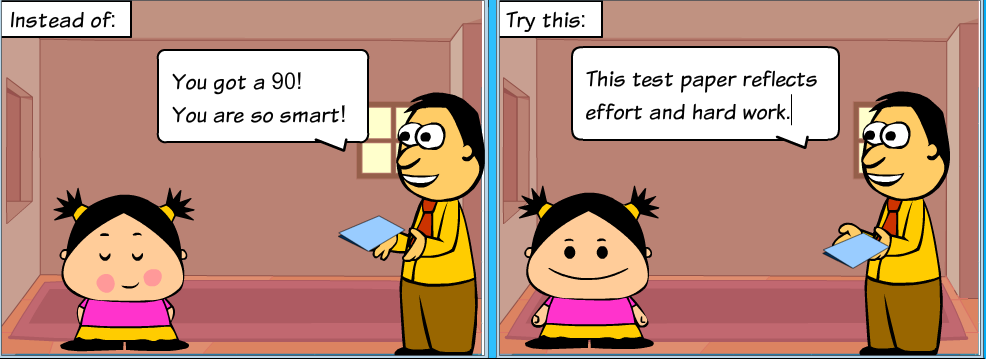Many times children will perform well in school and then slowly parents will notice a drop off in their grades. That is what happened with Kelly Freiman. Her son, Mikey, 11 enjoyed going to school. He didn’t love reading but was doing well in all his other subjects. As his 6th grade year progressed his grades moved from A’s and B’s to some C’s and one D. Kelly was concerned. She tried taking away his privileges if he didn’t do his homework and setting up incentive programs. Nothing seemed to work. She felt if he just put in more effort he would be able to do well.
It is difficult to motivate children to learn. It is one of the toughest challenges, parents and educators have. Parents have a vested interest in their child’s school performance. If their child fails they think they have failed as parents. They also feel it is a direct reflection on their parenting abilities. They blame themselves and confront their child in anger. A child then feels the pressure of having disappointed their parents. Besides their difficulties in school they are also dealing with the emotions of dragging their parents down. This causes children to feel even more discouraged and further compromises their academic career.
Many times parents will say to their child, “If you just try harder, you can do better.” It is difficult for children to listen to this type of vague directive. Many times children have problems with school and they don’t know how to even begin to improve their grades. They become embarrassed by their limitations. They will resort to clowning around or acting tough to cover their insecurities. This behavior can anger parents and teachers and distract them from focusing on the underlying academic issues.
There are many ways we can help our children when they are struggling in school. Here are 7 simple steps to help you manage :
1. Stay calm
Recognize that you are not solely responsible for your child’s academic success. When your child comes home with a bad grade, get objective. Tell yourself, “My son came home with a “D.” That is too bad. What is he missing that he needs help with? What can I help him do so that he can succeed and take responsiblity for his work?”
2. “You are so smart!”
Don’t praise your child for his intelligence, saying things like, “You are the brightest kid I know!” Instead make sure to praise him for working hard and for persevering at a difficult task. Children who are praised for putting in effort are more likely to keep trying when they encounter setbacks. They know they have control over their ability to learn. Children who are told they are smart have a harder time with school. They give up when they have to complete assignments that leave them feeling “not-so-smart”
 3. Don’t get mad
3. Don’t get mad
Instead of reacting to your child’s poor grade with anger respond with kindness and understanding. If you respond in frustration to your child’s less than perfect schoolwork, you actually decrease your child’s motivation to learn. It is important to periodically say, “I hope you know I love you no matter what your grades are.” Try to place the responsibility for his schoolwork back on your child where it belongs. Try saying, “I am sure you are disappointed with your grade. Let me know if I can help you or support you in anyway.”
4. Avoid power struggles
When we engage in power struggles with our children all learning stops. Children cannot learn when they are upset. We need to avoid the downward spiral into conflict. We can say, “I will always love you. I want you to make good choices in life even about school. I have faith that you can turn yourself around. I will always be here if you need some suggestions.”
5. Keep your relationships positive
The best thing you can do for your children is to maintain a loving relationship with them. Children who feel loved unconditionally will more likely do well in school. Don’t let your child feel that your approval is based on his grades. It is a recipe for disaster. Instead of wasting your energy on managing your child’s schoolwork develop ways to spend quality time with your child. It is a better use of time.
6. Talk to teachers
Set up a meeting to talk to your son’s teachers. Make sure to set a positive tone to the meeting. Start the conversation in a non-confrontational way: “I have been noticing a decline in Sara’s grades, have you noticed anything? Is there anything I can do at home to help him? What is your opinion of her academic performance?”
7. Get tested
Children sometimes will lag behind their peers because of subtle learning differences. Everyone has strengths and weaknesses. There are standardized tests that can help pinpoint deficits in learning.
In Mikey’s case, Kelly spoke to his teachers. They acknowledged that 6th grade can be more challenging for kids, even children who have always done well. Kelly spoke to Mikey calmly and he confided that he was having a hard time understanding the written work. He was too embarrassed to ask for assistance. His teachers were made aware of this and set up a system where Mikey could get some extra help. Kelly reported that his grades this semester have improved overall.
This is part of a full series on Help for Kids Struggling In School.
Want to go deeper and invest in developing your parenting skills? Adina’s Parenting Simply Foundations Workshop is a great place to start!



 3. Don’t get mad
3. Don’t get mad
11 Responses
Very helpful tips! My daughter is struggling in school right now. While her father thinks she should be disciplined, and acts very angry towards her…I can’t do that and this article reassures that. I don’t want my daughter to feel worse, and I don’t want her to feel pressure either. She’s clearly struggling already and I don’t want to make it worse. This article is reassuring to me that I am responding the appropriate way.
I am so glad that the article offers reassurance. Keep up the good work!
The article has some good information that we have been using at home for about two months. BUT I would like to help my son more. He is still struggling in school. What else can be do to support his learning?
Thank you. I have a third grader who was in a regular public school and every time we asked if our son was doing good the answer was always yes until conference time came. Now his first year as a third grader at a Charter school we find out he’s a year and a half behind.. Talk about a slap in the face. His new teacher is helping us with sending home a lot of extra work and my husband and I are spending all of our time helping in any way we can. This helps a lot.
I am so glad that this helps. I hope that everything works out for your son!
Thanks so much for your comment. I am so sorry it took me so long to get back to you! If your son is struggling in school it always good to get him evaluated. It will give you a great idea of what is strengths and weaknesses are.
You also want to make sure that the school is the right fit for him. He might need a less academic school or an approach that is different. Keep your eyes open.
Adina
Thank you for this article and your honesty! My son is in 6th grade and has been struggling so far. He’s a bright kid but misses the mark in comprehension. I feel like the teachers have let him slip through the cracks since about 4th grade. They presented the problem to me then and then said it was lack of effort. In 5th grade, it was lack of confidence. I think it is a mixture of all but I do believe things are not firing right when he reads his work. We have a tutor in place and are in the early stages of getting him extra help at school. He has always been an A & B student but is struggling so much this year that I’m ready to pull my hair out. My frustrations take over and I feel like because he’ s struggling now, he’ll never make anything out of himself. I hate feeling that way and this confirms that I need to approach the situation differently! I pray for my children every day that God uses them and helps them in school. I can do better though and I appreciate this article more than you will ever know!
I am so glad the article was of help! Just remember there is more to life than school and keep on praying!
Adina
this came at the right time my grade 4 daughter has been doing in the past grade but all of a sudden her remarks are a big disappointment that i feel personal lost asking myself what is wrong but thank you i will take tips from this article and see if it can be helpful.
#2 is so important! My son is very smart and very verbal, but he really struggles with crafts, writing, drawing, etc. – basically, anything that involves sitting still at a table. I’ve been reading your blog for a while, so I started talking with him about it, and he said it’s hard (or sometimes he says “impossible”) and he can’t do it. So I told him school is supposed to be a challenge – when something’s hard, we take a deep breath and we try again and it gets a little easier, and again and it’s even easier, until it’s not hard anymore and then we move on to something new that is “hard.” And now he even says this himself, “It was hard, but I took a deep breath and I tried again.” His teachers have noticed a big change and he is trying harder at crafts and writing. It’s making such a big difference!!!!
Hello,I have a 10 year old son he is in grade 4 he failed so he is repeating the grade he is struggling with making a sentence in setswana language and English how do help him to improve.